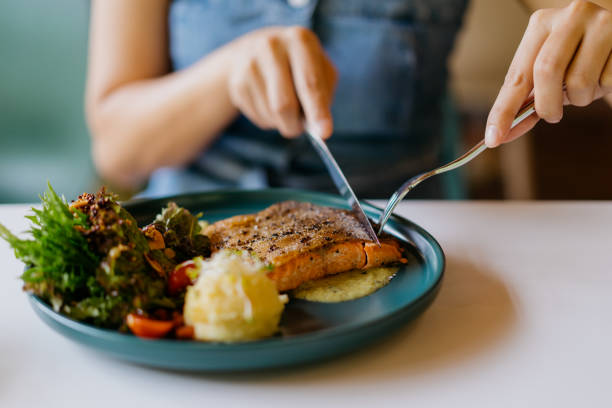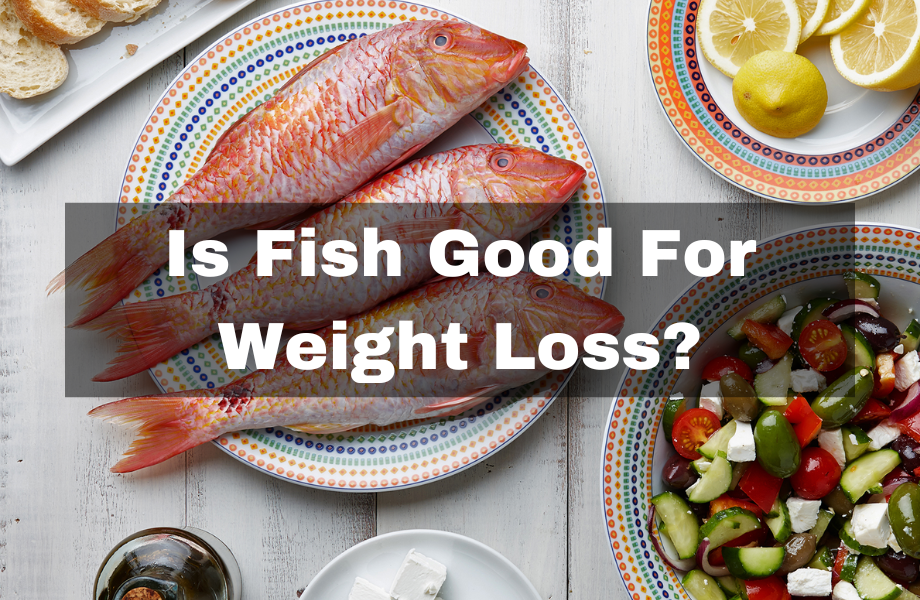When it comes to losing weight, you need to be following a healthy diet that provides you with all the nutrients you need without adding excess calories. Protein is a key part of this equation. That is because protein helps you maintain muscle mass while you are losing fat. It is also the most satiating of the macronutrients, so it helps to fill you up faster than carbs or fats.
Fish is one of the best sources of protein when you are following a diet for weight loss. In this article, we examine the reasons why you should be including fish in your weight loss diet.
Fish for Weight Loss

Fish are an excellent food for weight loss. They represent a low-calorie source of high-quality protein. Here are five reasons why they are so good for weight loss:
- Fish is very filling: As a quality form of protein, fish is extremely satiating. That means that it fills you up. After eating a palm-sized serving of fish you will be unlikely to have the urge to snack between meals.
- Fish has a high thermogenic effect: The thermogenic effect of a food refers to the energy required to digest it. About 30% of the calories in fish are burned up in the digestion process. This compares to about 10% for fats and carbohydrates.
- Fish is very easy to digest: If you compare eating fish to eating steak, you will appreciate how light and easy fish is to consume. As a result, you won’t feel weighed down and sluggish after eating fish, the way you may when eating red meat.
- Fish is relatively low in calories: When compared to red meat and chicken, a pound of fish has considerably fewer calories than a pound of red meat or chicken. The best choices for a low-calorie meal when you are dieting for weight loss are salmon, light tuna, and cod.
- Fish can reduce inflammation: Inflammatory problems can contribute to obesity. Fish is a rich source of omega-3 fatty acids. These have powerful anti-inflammatory properties that can reduce inflammation and, indirectly, help with weight loss.
7 More Reasons to Eat Fish

The benefits of eating fish go well beyond losing weight. Here are seven other reasons why you should be eating fish daily.
Fish is High in Omega-3 Fatty Acids
Fish contains both omega-3 and omega-6 fatty acids. Both of these fatty acids are vital for nervous system development and functioning, as well as cellular mechanics. Omega 3 helps to turn genes on and off. They are also involved in neurotransmission and a variety of other physiological processes.
Omega-3 fatty acids have also been shown to be beneficial in the heart. It helps to decrease cardiovascular complications in later life. [1]
Fish is Packed with Health-Giving Nutrients

Fish is a very nutrient-dense food choice. The fattier the fish, the more nutrients it contains. The main nutrients found in fatty fish are protein, iodine, vitamin D, and the aforementioned omega-3 fatty acids.
Fish May Lower Your Heart Attack Risk

Fish is an extremely heart-healthy food. There are many studies that show that people who eat fish regularly have a reduced likelihood of suffering a heart attack, or stroke. Once again, fatty fish has been found to be best in terms of heart health. [2]
Some excellent fish choices for heart health are tuna, trout, sardines, and mackerel.
Fish Improves Brain Functioning
As we grow older, the functioning of the brain naturally diminishes. This decline has been shown in a range of studies to be slower in populations of people that regularly eat fish. Those who eat fish every week have even been shown to have larger brain areas that control emotions and memory. [3]
Fish May Help with Depression
Depression is among the most common and serious health problems around the world. Research shows that people who eat fish on a weekly basis are less likely to suffer from depression. [4]
The ability of fish to help fight depression is thought to be due to its high omega-3 fatty acid content. Interestingly, omega-3 fatty acids have also been shown to help anti-depression medications to work better.
Fish May Help You to Sleep Better

More and more people are being affected by sleep disorders. Much of this is caused by exposure to blue light, with a deficiency in vitamin D also contributing to the problem.
In one study, held over a six-month period, 95 men were fed fish three times per week. These men showed significant improvement in both the quantity and quality of their sleep. It is believed that the main contributor to the improvement in sleep was the vitamin D content of the fish. [5]
Fish Protects Vision
There is research to show that fish is able to help reduce the effects of old age on people’s eyesight. Studies show that regular consumption of fish can reduce the incidence of age-related macular degeneration (AMD) by as much as 42 percent. [6]
How Much Fish Protein Should You Eat Daily?

The recommended daily intake to maintain a person’s muscle mass while losing weight is one gram of protein for every kg of body weight. So, a guy who weighs 80 kg should consume around 80 grams of protein each day.
To make things easy, let’s equate this to tuna as our sole source of fish. There are 132 calories in a 100-gram serving of tuna. Now, there are 4 calories in every gram of protein. So, when we divide 132 by 4 we find that 132 calories of tuna contain 33 calories.
To get our 80 grams of fish protein from tuna, we would have to eat two and a half 100-gram servings of fish in the form of tuna.
Frequently Asked Questions
Is fish or chicken best for weight loss?
Yes, fish is a better weight-loss protein option than chicken. That is because it is a lighter food that is easier to digest, Fish is also generally lower in calories, though this will depend on the type of fish you are eating. Oily fish also contains fatty acids that help to reduce inflammation, helping with fat loss.
What are the best fish varieties for losing weight?
While all types of fish are effective for weight loss, the best forms are those that are low in calories. Whitefish, canned tuna, saltwater fish, cold water fish, dolphin fish, albacore tuna, and salmon are all good options.
You should avoid fish that is high in heavy metals and mercury.
What should I eat alongside fish to lose weight?
Follow a balanced diet to achieve your weight loss goals and include a range of food sources. Include vegetables, fruits, and starchy carbohydrates as well as such healthy fats as avocado, coconut oil, and nuts.
Summary
Fish is clearly a very healthy food to eat and a smart choice for weight loss. As you probably already know, it is also very tasty. Furthermore, it is easy to prepare and eat. We recommend including it as your main protein source in several meals every week.
References
- Ruxton CH, Reed SC, Simpson MJ, Millington KJ. The health benefits of omega-3 polyunsaturated fatty acids: a review of the evidence. J Hum Nutr Diet. 2004 Oct;17(5):449-59. doi: 10.1111/j.1365-277X.2004.00552.x. PMID: 15357699.
- Djoussé L, Akinkuolie AO, Wu JH, Ding EL, Gaziano JM. Fish consumption, omega-3 fatty acids and risk of heart failure: a meta-analysis. Clin Nutr. 2012 Dec;31(6):846-53. doi: 10.1016/j.clnu.2012.05.010. Epub 2012 Jun 6. PMID: 22682084; PMCID: PMC3509256.
- Morris MC, Evans DA, Tangney CC, Bienias JL, Wilson RS. Fish consumption and cognitive decline with age in a large community study. Arch Neurol. 2005 Dec;62(12):1849-53. doi: 10.1001/archneur.62.12.noc50161. Epub 2005 Oct 10. PMID: 16216930.
- Grosso G, Galvano F, Marventano S, Malaguarnera M, Bucolo C, Drago F, Caraci F. Omega-3 fatty acids and depression: scientific evidence and biological mechanisms. Oxid Med Cell Longev. 2014;2014:313570. doi: 10.1155/2014/313570. Epub 2014 Mar 18. PMID: 24757497; PMCID: PMC3976923.
- Hansen AL, Dahl L, Olson G, Thornton D, Graff IE, Frøyland L, Thayer JF, Pallesen S. Fish consumption, sleep, daily functioning, and heart rate variability. J Clin Sleep Med. 2014 May 15;10(5):567-75. doi: 10.5664/jcsm.3714. PMID: 24812543; PMCID: PMC4013386.
- Christen WG, Schaumberg DA, Glynn RJ, Buring JE. Dietary ω-3 fatty acid and fish intake and incident age-related macular degeneration in women. Arch Ophthalmol. 2011 Jul;129(7):921-9. doi: 10.1001/archophthalmol.2011.34. Epub 2011 Mar 14. PMID: 21402976; PMCID: PMC3134638.







